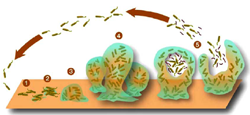University Receives Department of Energy Funding for New Building Training and Assessment Centers
The University has received funding from the U.S. Department of Energy (DOE) to create new Building Training and Assessment Centers (BTACs) to train undergraduate and graduate engineering students and build a clean energy workforce. The SU-BTAC, aligned with the vision…


 When planktonic or swimming bacterial microorganisms attach themselves to a surface, they secrete polysaccharides, creating a matrix of slimy polymers. There are numerous types of biofilms that are created by different phenotypes of bacteria. One bacterial type is responsible for the plaque that builds up on teeth, while another type builds up on the surface of Navy vessels, which creates additional drag and power loss as they sail through the seas. Bacteria can also colonize in arteries and lungs, leading to life-threatening infections. Biofilms are extremely resistant to antibiotics, as compared to planktonic bacteria.
When planktonic or swimming bacterial microorganisms attach themselves to a surface, they secrete polysaccharides, creating a matrix of slimy polymers. There are numerous types of biofilms that are created by different phenotypes of bacteria. One bacterial type is responsible for the plaque that builds up on teeth, while another type builds up on the surface of Navy vessels, which creates additional drag and power loss as they sail through the seas. Bacteria can also colonize in arteries and lungs, leading to life-threatening infections. Biofilms are extremely resistant to antibiotics, as compared to planktonic bacteria.